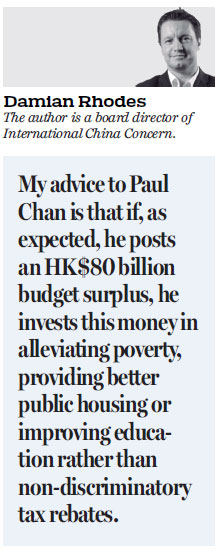New financial secretary can make a big difference
Updated: 2017-02-21 07:39
By Damian Rhodes(HK Edition)
|
|||||||||
Damian Rhodes writes that Paul Chan needs to take a more creative approach by using abundant financial resources to narrow the wealth gap and improve lives of the less fortunate
On Wednesday, Financial Secretary Paul Chan Mo-po will deliver his first ever budget announcement, now that John Tsang Chun-wah has resigned to join the Chief Executive election. What can we expect in this announcement? It is expected that there will be a budget surplus of perhaps HK$80 billion.
Paul Chan's role as finance head is by no means secure in the coming years as a new CE could choose another and so he might wish to use this announcement to make an impact. I find it hopeful that in his blog of Feb 12, he spoke of the importance of alleviating poverty - particularly among the elderly and those on low incomes.
In recent years the government has injected money into the Mandatory Provident Fund scheme and even paid back HK$6,000 per person to every permanent resident, as happened in 2011. These payments benefitted tycoons and those in poverty alike. Perhaps this year, there could be new focus on benefitting those in greatest need on the margins of our society.

I am proud of the fact that Hong Kong has one of the freest economies in the world. The economic freedom and prosperity are among the things I like most about this city. As an entrepreneur, employer and businessman, I appreciate the "work hard, play hard" culture and the competitiveness which seems to have imbued most Hong Kong people.
There are few cities in the world where I could set up a business so easily with so little government interference. High performers are attracted to Hong Kong, knowing that they can work in a world city without being stung by exorbitant income tax and can keep most of what they earn.
One aspect of Hong Kong life that saddens me, however, is that despite its incredible wealth there are still people living in abject poverty. There are people in their 60s and older wheeling barrows of cardboard and other recyclable discards for a pittance. There are people living in cages dreaming that, by some miracle, they may be expedited on the never-ending waiting list for public housing. There are families who cower together in one bunk bed in a subdivided flat the size of a five-star hotel lift. There are schoolchildren who wander about in the street after school aimlessly because they find it impossible to do their homework in the cramped, windowless subdivided flats they call home.
My advice to Paul Chan is that if, as expected, he posts an HK$80 billion budget surplus, he invests this money in alleviating poverty, providing better public housing or improving education rather than non-discriminatory tax rebates.
Refugees in Hong Kong live on less than HK$50 a day. These include pregnant women, professionals, families and human-trafficking victims who have witnessed unspeakable violence, and left literally everything behind to flee these degrading conditions before they finally reached our city for refuge. Would there be a way in which these people, currently unable to work, could be given financial incentives to contribute to society, live with dignity and contribute their work to the local economy?
Land is scarce in Hong Kong but there are many unused industrial buildings. Could budget surpluses be used to redevelop these buildings and transform them into community centers for the elderly or young people and low-rent basic offices for startups and entrepreneurs working on a shoestring? Better still, convert them into public housing, rather than using land from our country parks. We need to take a more creative approach in using our abundant financial resources to narrow the wide gap in the standard of living among our citizens.
Human trafficking is a real problem in Hong Kong, with women from overseas being tricked into prostitution and suffering abuse as they work to pay off seemingly insurmountable debts. A greater investment in police resources and social workers might help identify, rescue and support these women who currently have very little hope or see an end to their plight.
Budget surpluses could also be used to transform our education system which concentrates on force-feeding students with facts and driving some of them to depression and suicide. An investment could be made in counseling services for young people or youth centers. It is also time to look into how to provide more affordable alternatives in education in order to reflect the city's cosmopolitan aspirations. The city would benefit from more direct subsidy scheme schools as families with overseas education or work experience are struggling to find the right place for their children.
Paul Chan has an opportunity to make a significant difference in Hong Kong and to make his mark as someone with more pragmatic priorities than his predecessor.
(HK Edition 02/21/2017 page8)